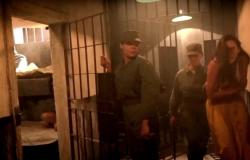
In a moment of The chimera, the exceptional new film by Italian director Alice Rohrwacher, a character tells the protagonist that he has the gift of finding what is lost, those ancient treasures whose value he himself defines as that of “objects that have been seen by many eyes.” Rohrwacher’s own cinema (Fiesole, 1980) is thus related to the hidden place pursued by the archaeologist-dowser played by the British actor Josh O’Connor. A new tragic hero for this director who, like him, feeds on the flow of the ancient world and the gaze of others, the living and the dead.
Nobody tells about Italy today, its old utopian and anarchist subsoil, its past of minstrels, harlequins and columbians, its eternal beauty, like Rohrwacher; an unusual filmmaker, comparable only to her compatriot Pietro Marcello (Martin Eden, Scarlet) in his efforts to revive on his own terms the poetic and humanist legacy of the Italian neorealist tradition. Rohrwacher’s dreamlike images move between the sacred and the earthly with the vital fatality of the martyr Pasolini (“I will leave in a verse”), the street tenderness of Fellini’s The road (1954) and the revolution of kindness that Rossellini proclaimed in Francis, minstrel of Godyes (1950).
The adventure of The chimera It takes place in the eighties, when young Arthur (a great Josh O’Connor in his helpless purity) wakes up on a returning train, in the middle of a strange dream that places him beyond immediate reality. Arthur is an angelic and ragged young man whose filthy linen suit gives him the aura of a true dandy. A romantic hero who suffers the loss of his love and who, obsessed with death and funerary art, survives with a group of tomb robbers (tombarolis) who deal with Etruscan mortuary pieces. Rohrwacher shows us a mythical territory located between the manifest layer of history, in which carnies and rogues make fun of everything with the lightness of mountebanks, and its deepest dimension. Between drama and pantomime, the filmmaker summons captivating images thanks to her mix of tones, music, screen formats and photography grains, from Super 8 to 16 and 35 millimeters.
Hand in hand with O’Connor’s character, Rohrwacher also lands, as in his wonderful Happy Lazzaro (2018), in a world of ruined palaces. There, in a past of beautiful peeling frescoes, the decadent matriarch played by Isabella Rossellini survives, whose presence is not anecdotal. The daughter of the totem of neorealism, of the filmmaker who warned of the “self-destructive fury” of the civilization of consumption and entertainment, represents in The chimera to the living who still talk to the dead. Because under the weight of tradition, and despite its skin and its decrepit walls, there is also room for a last breath, brought about by the character of Italy, played – and it does not seem coincidental either – by a foreign actress, the luminous Carol Duarte. She is the hope of a lost utopia, the last link with the original myth of the goddess, which the filmmaker explicitly summons to resurrect it under a feminine and communal ideal. It is a way of understanding life and art, plundered by a market that rots and profanes everything, as a mystery in which the old order, with its inevitable final sacrifice, gives rise to a new world.
The chimera
Address: Alice Rohrwacher.
Performers: Josh O’Connor, Carol Duarte, Vincenzo Nemolato, Isabella Rossellini, Alba Rohrwacher.
Gender: drama. Italy, 2023.
Duration: 130 minutes.
Premiere: February 19.
All the culture that goes with you awaits you here.
Subscribe
Babelia
The literary news analyzed by the best critics in our weekly newsletter
RECEIVE IT
Subscribe to continue reading
Read without limits
_





